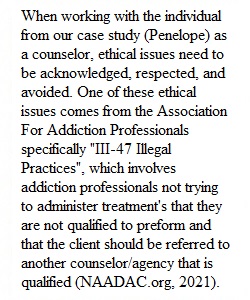


Q 2-1 Discussion: Ethical Issues Group/section restrictions. Must post first. Subscribe This is a group activity. For more information on groups, please see About Group Work. In this discussion, you will be identifying potential ethical issues that you may face while counseling the individual in the case study. This week and for all following weeks in this course, you will be discussing with a small group rather than the whole class. Remember that for all discussions, you will not be able to see what your peers have written until after you have submitted your own initial post. After reviewing Penelope Case Study: Part One PDF and reviewing the NAADAC/NCC AP Code of Ethics, in your initial discussion post identify at least one ethical issue you may encounter while Penelope is in treatment. Support your answer using principles from the Code of Ethics. On the website, the code of ethics is located under the text "The Revised Code of Ethics is divided under major headings and standards." The sections are: I. The Counseling Relationship II. Evaluation, Assessment and Interpretation of Client Data III. Confidentiality/Privileged Communication and Privacy IV. Professional Responsibility V. Working in a Culturally Diverse World VI. Workplace Standards VII. Supervision and Consultation VIII. Resolving Ethical Issues IX. Communication and Published Works X. Policy and Political Involvement As your respond to your peers' posts, discuss additional principles that may apply to Penelope's case and appropriate ways for a substance abuse counselor to handle these situations. Refer to the Discussion Rubric PDF for directions on completing this discussion.
View Related Questions